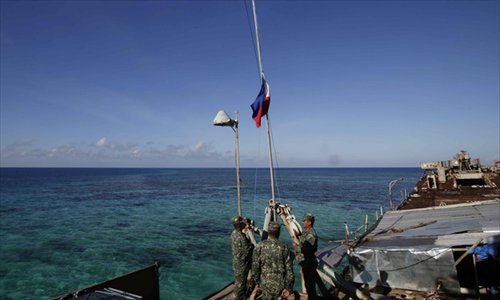Philippines to push for sea conduct code

Philippine Marines raise the Philippine flag on the dilapidated navy ship LT57 BRP Sierra Madre at the disputed Ren’ai Reef in the South China Sea on March 30. On March 29, China Coast Guard attempted to block the Philippine government vessel AM700 carrying fresh troops and supplies, but the latter managed to dock beside the ship to replace troops who were deployed several months ago. Photo: AP
The Philippines is expected to further flare up tension with China by pushing for quick finalization of a Code of Conduct (COC) for the South China Sea at the upcoming ASEAN meeting amid already strained ties due to its seizure of a Chinese fishing boat.
Analysts said Manila, emboldened by Washington and assisted by Tokyo, is following an orchestrated plan to internationalize disputes over the South China Sea.
According to Philippine news network Rappler, Assistant Secretary Charles Jose of the Philippines Department of Foreign Affairs said Wednesday President Benigno Aquino III's agenda at the ASEAN meetings held in Nay Pyi Taw on Saturday and Sunday includes pushing for "the early conclusion of the COC."
Aside from the COC, Jose said Aquino will likely inform other ASEAN leaders about the progress of the Philippines' seeking international arbitration over the South China Sea. He said there will also likely be discussions on the general situation in the South China Sea, and a shared "statement of concern" by ASEAN on the situation, Rappler reported.
Li Mingjiang, an associate professor at the S. Rajaratnam School of International Studies at Nanyang Technological University in Singapore, said although the Philippines and Vietnam will push for discussions on the South China Sea, they don't have enough leverage to persuade the eight other members of ASEAN to back their appeal.
Compared with previous statements issued after ASEAN meetings, "content on the South China Sea may take up more space in the statement, and the tone may be slightly harsher," Li told the Global Times.
"However, I don't think the statement will explicitly name China, and it won't change ASEAN's stance on the South China Sea," he said.
Manila's attempt to instigate tension at the regional meeting came after its detention of a Chinese fishing boat with 11 crew aboard at Half Moon Shoal in the Nansha Islands Tuesday. The boat was towed to the Philippine province of Palawan.
Fishermen aboard another boat, which was in the sea area when it happened, accused the Filipino police of firing shots at them.
But Philippine National Police official Noel Vargas denied the accusation, according to an AFP report.
It was the first seizure of a Chinese fishing boat by the Philippines since a Beijing-Manila standoff over Huangyan Island in the South China Sea in April 2012.
Wang Xiaopeng, an expert in maritime and border studies at the Chinese Academy of Social Sciences, said the seizure of a Chinese ship was a provocation timed during the joint drill between the US and the Philippines.
The two-week drill started Monday, with more than 5,000 US and Filipino troops participating.
The US intended to rally its allies' confidence over its pivot to Asia through President Barack Obama's visit, during which a 10-year defense deal was signed between Manila and Washington.
Wang said during the tour, the US sent false signals to the Philippines. According to the deal, US troops are given access to Filipino military bases, most of which are in the western part of the country facing the South China Sea.
"Manila interpreted it as US military backing," Wang said.
Meanwhile, it has also drawn up a defense plan to beef up its security fence in the South China Sea, which includes deployment of ships and planes as well as infrastructure construction on islets occupied by Manila.
"Although the US didn't say the Nansha Islands fall within its military pact with the Philippines, Manila is preparing for a US military presence in the area," Wang said.
While the US provides military aid to the Philippines, Japan is also supporting Manila standing up to Beijing.
During a speech to the governing body of NATO this week, Japanese Prime Minister Shinzo Abe criticized Beijing not only for its own territorial disputes in the East China Sea, but also said it is "unilaterally changing the status quo by force or coercion" in the South China Sea.
Li said Tokyo has for a long time tried to link the disputes in the East China Sea and South China Sea, not only by words but also through deeds such as helping build up the Philippines' maritime law enforcement capacity.
Japan has provided advanced patrol ships to the Philippines.
"In order to deal with the situation, China must push forward its maritime defense strategy, reinforcing its compatibility for landing operations, so as to deter relevant countries from provoking trouble," Wang told the Global Times.